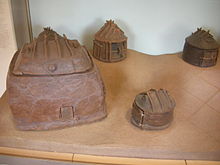Hut (dwelling)

A hut is a simple shelter that is built by humans. A hut is small, and most of the time, it is less well-built than a house, but is more complex than a tent. Some indigenous peoples use huts as their permanent place of safety. A hut can be built out of many things, such as wood, grass, or fabric.[1]
The word hut[change | change source]
The word is, many times, used by people who think homes that are uncommon in their country are primitive. Sometimes, the word house is used to avoid this. Often, how the hut looks is based off of tradition. The design of the hut in tropical and sub-tropical areas is meant to allow air to come inside, reducing the heat inside of the hut. Also, instead of being called a shed, something can be called a hut. The word has also been used to speak about structures that shelter climbers and backpackers. The word comes from the 1650s, from French hutte.[2]
Modern use[change | change source]
Huts are used by shepherds when they are moving animals from one grassland to another. They are also used by people who are traveling in rural areas. Some populations use huts during a diaspora, such as those on farms in the Amazon jungle.[3] Huts have been built to keep items safe, to build items, and to teach when regular classrooms cannot be used.[4]
Construction[change | change source]
Many huts are planned to be built quick, and with a small amount of work. These huts only need a bit of understanding of architecture to be built, and do not need special tools.[5]
Other uses[change | change source]
Sometimes, the word hut is used in the names of stores, to imply that it is a small place, and that it is friendly. Some stores that use the word in their name are Pizza Hut and Sunglass Hut. Buildings that sell things in a park or beach can look like huts.
References[change | change source]
- ↑ Eiger, Richard W. (2009-10-22). "John Simpson (ed.): Oxford English Dictionary, Second Edition on CD-ROM Version 4.0". Publishing Research Quarterly. 25 (4): 280–281. doi:10.1007/s12109-009-9131-1. ISSN 1053-8801. S2CID 142695426.
- ↑ "Etymonline - Online Etymology Dictionary". www.etymonline.com. Retrieved 2023-03-18.
- ↑ Adam, David (2009-05-31). "Amazon rainforests pay the price as demand for beef soars". The Guardian. ISSN 0261-3077. Retrieved 2023-03-18.
- ↑ "When kids were schooled in WWII quonset huts". goldcountrymedia.com. Retrieved 2023-03-18.
- ↑ "How to Build a Primitive Long Term Survival Shelter". 2021-01-09. Retrieved 2023-03-20.
